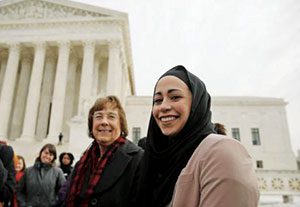
WASHINGTON — On Wednesday, a majority of U.S. Supreme Court justices signaled support for a Muslim woman who filed a lawsuit after she was denied a job at an Abercrombie & Fitch Co clothing store in Oklahoma because she wore a head scarf for religious reasons.
The nine justices heard a one-hour argument in an appeal brought by the U.S. Equal Employment Opportunity Commission (EEOC), a federal agency that sued the company on behalf of Samantha Elauf. She was denied a sales job in 2008 at an Abercrombie Kids store in Tulsa when she was 17.
The case involving alleged workplace discrimination against a young Muslim woman in the American heartland comes before the top U.S. court at a time when some Western nations are struggling with culture clashes relating to accommodating local Islamic populations. The United States has not, however, faced the same tensions as some European countries, including France.
The legal question is whether Elauf was required to ask for a religious accommodation in order for the company to be sued under the 1964 Civil Rights Act, which, among other things, bans employment discrimination based on religious beliefs and practices.
Elauf was wearing a head scarf, or hijab, at the job interview but did not specifically say that, as a Muslim, she wanted the company to give her a religious accommodation.
The company denied Elauf the job on the grounds that wearing the scarf violated its “look policy” for members of the sales staff, a policy intended to promote the brand’s East Coast collegiate image.
During the oral argument, it appeared the court’s four liberal justices were likely to vote in Elauf’s favor. At least one of the court’s conservatives, Justice Samuel Alito, seemed set to follow suit.
Senior liberal Justice Ruth Bader Ginsburg criticized the company’s argument that its decision not to hire her was based on the “look policy” and that whether or not Elauf was a Muslim was irrelevant.
Ginsburg said the civil rights law requires certain people to be treated differently to other applicants if they have a religious requirement.
Muslim groups said in a friend-of-the-court brief in support of Elauf that employment discrimination against Muslims is widespread in the United States. Often, the act of a woman wearing a head scarf is what triggers the discrimination, according to the brief. The EEOC has reported that Muslims file more employment claims about discrimination and the failure to provide religious accommodations than any other religious group.
A ruling is due by the end of June.






Leave a Reply